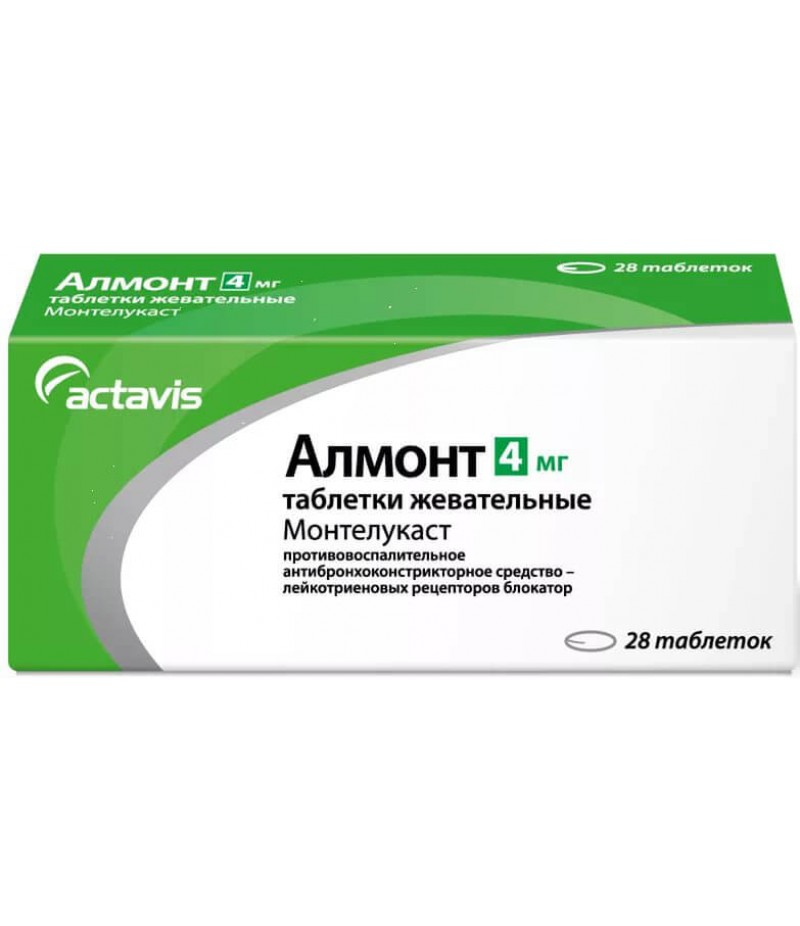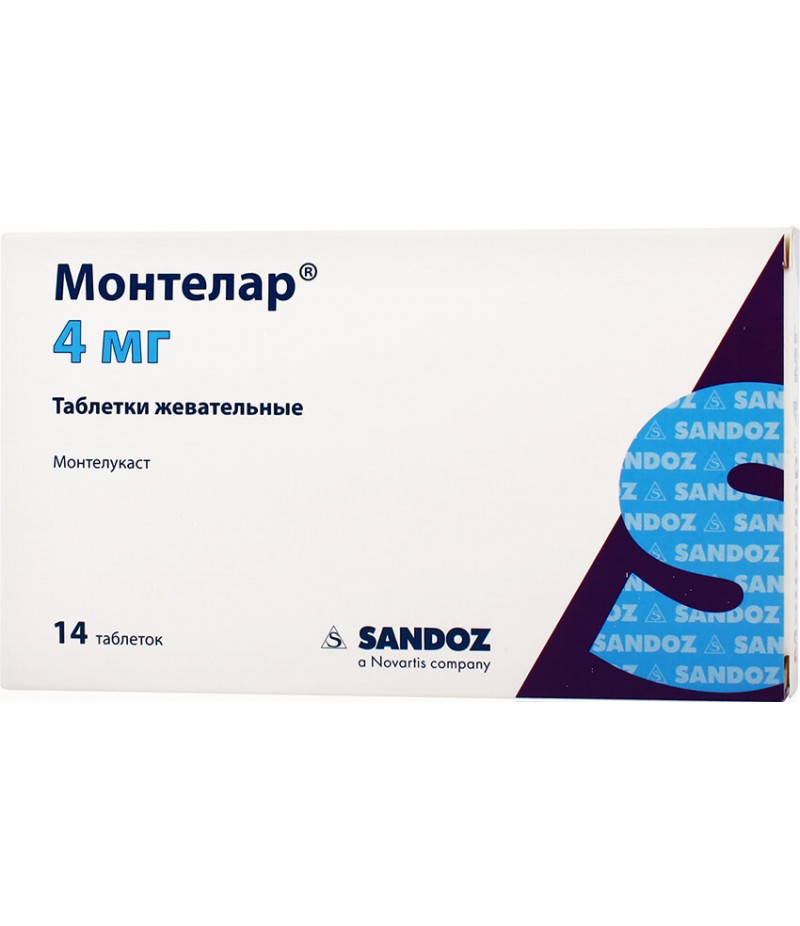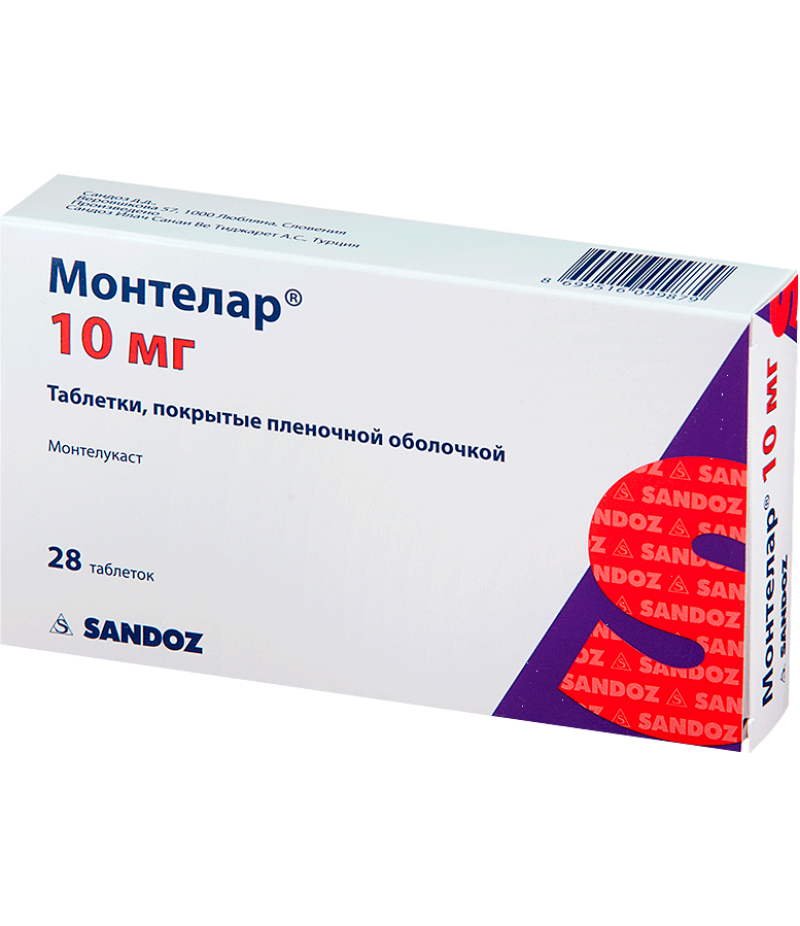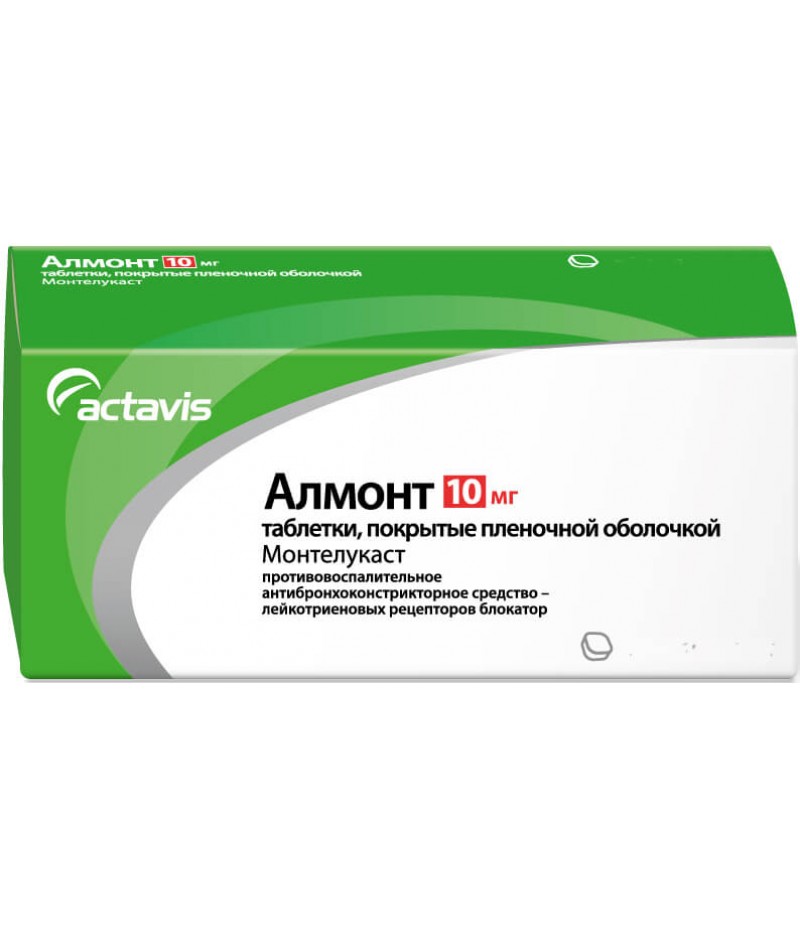Almont tabs 4mg #28
- $42.30
- 2 or more $41.25
- 3 or more $39.99
- Availability:In Stock
Almont instruction for useReed more and buy Almont on this pageCompositionPillsActive substance: Montelukast 4.00 mg (in the form of sodium Montelukast 4.16 mg);Auxiliary substances: mannitol 160.96 mg, microcrystalline cellulose ..
Tags: tabs
Almont instruction for use
Reed more and buy Almont on this page
Composition
Pills
Active substance: Montelukast 4.00 mg (in the form of sodium Montelukast 4.16 mg);
Auxiliary substances: mannitol 160.96 mg, microcrystalline cellulose 52,80 mg, giprolose 7.20 mg, croscarmellose sodium 7.20 mg, pigment Pigment Blend PB-24880 (lactose monohydrate 3,60 mg, iron oxide oxide red 0.40 mg) 4.00 mg, magnesium stearate 2.40 mg, aspartame 1.20 mg, cherry flavoring (Silarom Cherry Flavor 1219813182) 0.08 mg;
pharmachologic effect
A leukotriene receptor antagonist. Almont for the treatment of bronchial asthma and allergic rhinitis.
Indications for Almont
Prophylaxis and long-term treatment of bronchial asthma in children, including:
prevention of day and night symptoms of the disease (for children from 2 years and older);
treatment of bronchial asthma in patients with hypersensitivity to acetylsalicylic acid (for children 6 years and older);
prevention of bronchospasm caused by physical exertion (for children from 2 years and older).
Contraindications
Hypersensitivity;
patients with rare hereditary diseases: galactose intolerance, lactase deficiency or glucose-galactose malabsorption;
phenylketonuria (contains aspartame);
children under 2 years of age (for a dosage of 4 mg);
- Children under 6 years (for a dosage of 5 mg).
Side effects of Almont
Infectious and parasitic diseases: upper respiratory tract infections. Disorders from the blood and lymphatic system: increased tendency to bleeding, thrombocytopenia.
Immune system disorders: hypersensitivity reactions, including anaphylaxis, eosinophilic liver infiltration.
Disorders of the psyche: pathological dreams, including nightmares;
hallucinations, insomnia, somnambulism, irritability, anxiety, anxiety; agitation, including aggressive behavior or hostility; tremor, depression, disorientation, suicidal thoughts and behavior (suicidal).
Disturbances from the nervous system: headache, dizziness, drowsiness, paresthesia / hypoesthesia, convulsions.
Impaired heart: a feeling of palpitations.
Disturbances from the respiratory system, chest and mediastinum: nasal bleeding.
Disorders from the gastrointestinal tract: diarrhea, dry mouth, dyspepsia, nausea, vomiting, abdominal pain, pancreatitis.
Disorders from the liver and bile ducts: increased activity of alanine aminotransferase and aspartate aminotransferase, hepatitis (including cholestatic, hepatocellular and mixed liver damage).
Violations of coeyuya and subcutaneous tissues: angioedema, a tendency to the appearance of bruising, urticaria, skin itching, rash, erythema nodosum, erythema multiforme.
Disturbances from the musculoskeletal and connective tissues: arthralgia, myalgia, including muscle cramps.
General disorders and disorders at the site of administration: asthenia / fatigue, malaise, edema, pyrexia, thirst.
In very rare cases, during the treatment with montelukast, the development of the Chard-Strauss syndrome was reported (see section Special instructions).
Interaction
In patients who simultaneously received phenobarbital, the area under the pharmacokinetic concentration-time curve of montelukast decreased by about 40%, however, no correction of the dosing regimen in such patients is required. Since montelukast is metabolized by the CYP3A4 isoenzyme, caution should be used, especially in children, if montelukast is simultaneously used with inducers of the CYP3A4 isoenzyme, such as phenytoin, phenobarbital and rifampicin. Montelukast can be prescribed together with other drugs traditionally used for the prevention and long-term treatment of bronchial asthma and / or allergic rhinitis. Montelukast at the recommended therapeutic dose did not have a clinically significant effect on the pharmacokinetics of the following drugs: theophylline, prednisone, prednisolone, oral contraceptives (ethinylestradiol / norethynodrel 35/1), terfenadine, digoxin and warfarin.
In vitro studies found that montelukast is a strong inhibitor of the isoenzyme CYP2C8. However, in studies of Almont interaction in vivo of montelukast and rosiglitazone (a marker substrate, a representative of drugs primarily metabolized by the CYP2C8 isoenzyme), no confirmation of the inhibition of the isoenzyme CYP2C8 by montelukast has been obtained. Thus, in clinical practice, the effect of montelukast on CUR2C8-mediated metabolism of a number of drugs is not expected, including. paclitaxel, rosiglitazone, repaglinide.
In vitro studies have shown that montelukast is a substrate of the isoenzyme CYP2C8, and to a lesser extent isoenzymes CYP2C9 and CA4. Data from the clinical trial of drug interaction for montelukast and gemfibrozil (an inhibitor of both CYP2C8 and 2C9) demonstrate that gemfibrozil increases the effect of systemic exposure to montelukast 4.4-fold. The simultaneous administration of itraconazole, a strong inhibitor of the isoenzyme CYP3A4, together with gemfibrozil and montelukast did not lead to an additional increase in the effect of systemic exposure to montelukast. The effect of gemfibrozil on the systemic effect of montelukast can not be considered clinically significant on the basis of safety data when administered at doses exceeding the approved dose of 10 mg for adult patients (eg 200 mg / day for adult patients for 22 weeks and up to 900 mg / day for patients,
taking a drug for about one week, there were no clinically significant negative effects). Thus, when combined with gemfibrozilom dose adjustment montelukast is not required. According to the results of in vitro studies, clinically significant drug interactions with other known inhibitors of the CYP2C8 isoenzyme (for example, with trimethoprim) are not expected. In addition, the joint administration of montelukast with itraconazole alone did not result in a significant increase in the effect of systemic exposure to montelukast. Combined treatment with bronchodilators
Almont is a justified addition to monotherapy with bronchodilators if the latter do not provide adequate control of bronchial asthma. After the therapeutic effect is achieved, a gradual reduction in the dose of bronchodilators can be started. Combined treatment with inhaled glucocorticosteroidsю
Treatment with the drug Montelast provides an additional therapeutic effect to patients who use inhaled GCS. Once the stabilization of the condition is achieved, it is possible to begin a gradual reduction in the dose of GCS under the supervision of a physician. In some cases, complete cancellation of inhaled glucocorticosteroids is permissible, however, a sharp substitution of inhaled glucocorticosteroids for the preparation of Montelast is not recommended.
How to take, intake and dosage
Inside, the tablet should be chewed. Admission of Almont by children is carried out under the supervision of adults. The drug Montelast should be taken 1 hour before or 2 hours after meals. With bronchial asthma or bronchial asthma and allergic rhinitis: For children aged 2 to 6 years - 1 chewable tablet at a dose of 4 mg once a day in the evening. For children aged 6 to 14 years - 1 chewing tablet at a dose of 5 mg once a day in the evening. For allergic rhinitis: For children aged 2 to 6 years - 1 chewable tablet at a dose of 4 mg once a day and for children aged 6 to 14 years - 1 chewable tablet at a dose of 5 mg once a day in individual mode depending on the time of the greatest exacerbation of symptoms. There is no need for dose adjustment within these age groups. General recommendations The therapeutic effect of Almont, allowing to control the symptoms of asthma, is achieved within a day after taking. The patient is recommended to continue taking Almont, both during periods of controlled course of bronchial asthma, and during the exacerbation of bronchial asthma. Patients with renal insufficiency and patients with hepatic insufficiency of mild and moderate severity are not required to select a special dose. No dosage adjustment is required depending on the patient's sex. There is no data on the use of montelukast in patients with severe impairment of liver function.
Overdose
Symptoms of drug overdose in patients with chronic bronchial asthma when administered at a dose exceeding 200 mg per day for 22 weeks and at a dose of 900 mg per day for 1 week are not revealed. There are reports of acute overdose of montelukast (when taking at least 1 g per day) in the postmarketing period and in clinical studies in adults and children. Clinical and laboratory data indicate that the safety profile of Almont is consistent in children, adults and elderly patients. The most common symptoms were thirst, drowsiness, vomiting, psychomotor agitation, headache and abdominal pain. Treatment: symptomatic therapy.
Special instructions for Almont
The drug Almont is not recommended for the treatment of acute attacks of bronchial asthma. Patients with bronchial asthma should always have emergency medications. When the onset of an acute attack should be used inhaled beta-adrenomimetics short-acting. Patients should consult their doctor as soon as possible if they need more inhalation of short-acting beta-adrenomimetics than usual.
Do not dramatically replace the drug Almont therapy with inhaled or oral GCS. There are no data proving the possibility of reducing the dose of oral GCS against the background of simultaneous administration of montelukast.
In rare cases, patients who receive anti-asthmatic drugs, including montelukast, may develop systemic eosinophilia, which is sometimes accompanied by clinical signs of vasculitis, the so-called Chard-Strauss syndrome, a condition that is eliminated by the use of systemic SCS. These cases, as a rule, are associated with a decrease in dose or cancellation of oral corticosteroids. It is impossible to exclude or establish the possibility that leukotriene receptor antagonists may be associated with the development of the Chard-Strauss syndrome. Therefore, doctors should be warned about the possibility of eosinophilia, vascular rash, increased pulmonary symptoms, heart complications and / or neuropathy in patients. Patients who developed the above symptoms, it is necessary to undergo a second examination, and the scheme of their treatment should be reviewed. Treatment with Almont does not lead to the prevention of bronchospasm in patients with increased sensitivity to acetylsalicylic acid, with the use of acetylsalicylic acid and other non-steroidal anti-inflammatory drugs.
The drug Almont contains aspartame, a source of phenylalanine. This drug may cause harm to patients with phenylketonuria.
The drug contains lactose monohydrate and should not be taken to patients with rare hereditary abortions: galactose intolerance, lactase insufficiency or glucose-galactose malabsorption.
Impact on the ability to drive vehicles and mechanisms
Typically, montelukast does not affect the ability to drive vehicles or work with other mechanisms, but very rarely some patients have experienced drowsiness and dizziness, when these symptoms appear, patients are not advised to drive vehicles and engage in other activities requiring concentration and speed psychomotor reactions.
Storage conditions
In a dry, the dark place at a temperature of no higher than 30 ºС.
Shelf life - 3 years
Terms of sell
To buy Almont you don't need a prescription.




